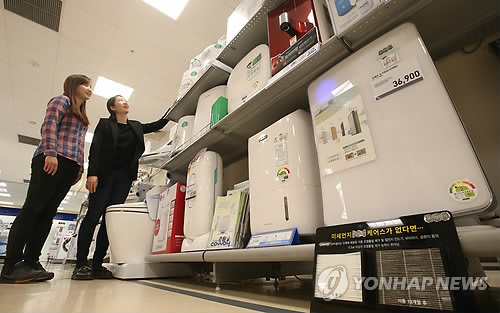3M under fire for silence over problematic filter
By Lee Hyun-jeongPublished : July 3, 2016 - 17:51
Multinational conglomerate 3M is remaining silent over its potentially toxic filters used in local air cleaners, stirring public anger over the lack of countermeasures.
Earlier last month, a local broadcast revealed that a toxic substance called OIT was detected in air cleaners produced by Cuckoo and Dayou-winia. LG Electronics also admitted later that it had found the same issue in products. The filters of those products were all provided by 3M.
Earlier last month, a local broadcast revealed that a toxic substance called OIT was detected in air cleaners produced by Cuckoo and Dayou-winia. LG Electronics also admitted later that it had found the same issue in products. The filters of those products were all provided by 3M.

OIT, or octylisothiazolinone, is a toxic chemical substance related to CMIT, which has recently been pinpointed as one of the toxic ingredients of problematic humidifier disinfectants. Known to cause dermatitis allergic reactions, OIT was designated as a toxic chemical by the Environment Ministry in 2014.
“OIT can also be toxic when inhaled. According to the U.S. Environmental Protection Agency’s report, the inhalation-toxicity level of OIT was equivalent to that of widely known disinfectant ingredients such as PHMG,” said Leem Jong-han, an occupation and environment medicine professor from Inha University. He also heads the Korean Society of Toxicology.
As public concerns grew over the filter, the Environment Ministry launched a probe over the inhalation toxicity. The probe result is scheduled to be released later this month.
Acknowledging the public concerns, air purifier companies voluntarily vowed to recall problematic air cleaners and replace them for free. While the exact number has not been confirmed, tens of thousands of customers are speculated to have been exposed to the toxic substance, industry sources said.
Despite the ongoing controversy over the filter, 3M has neither taken measures nor made remarks over the case for both air cleaner-makers and customers, citing that the ministry’s toxicity test is underway. “(The company believes that) the best action for now is to just wait for the probe result,” a 3M offcial said on condition of anonymity.
Some air purifier companies are mulling action against 3M.
“(The headquarters) may consider launching a lawsuit against 3M over compensation after the government releases the probe result,” an official from Cuckoo told The Korea Herald.
Some argue that the lack of countermeasures is not limited to 3M, claiming several multinational companies have overlooked Korean customers when product-related issues have broken out.
In the case of Volkswagen, the company recently offered to provide compensation of $15 billion to car owners in the U.S. over the diesel emissions scandal. Yet, the carmaker has not come up with any compensation measures for Korean customers. About 125,000 problematic Volkswagen cars were sold in Korea.
Similar issues have taken place in the Korean mobile phone market. Smartphone giant Apple has not run “Genius Bar” tech support stations in Apple retail stores while it has provided the service in other countries such as the U.K. and Japan. Apple Korea has only allowed phone to be exchanged for refurbished phones.
The lack of consumer rights protection regulations can be attributed to insufficient compensation policies of multinational companies, experts said.
“The current laws for protecting consumer rights is not sufficient and the government mainly focuses on taking administrative measures, such as punishing the companies with financial penalties, said civic group Voice for Consumers.
“When calculating the amount of compensation, (the authorities) mostly limit the damage to physical damage, whereas the U.S. also recognizes mental damage,” the civic group added.
By Lee Hyun-jeong (rene@heraldcorp.com)



![[Herald Interview] 'Amid aging population, Korea to invite more young professionals from overseas'](http://res.heraldm.com/phpwas/restmb_idxmake.php?idx=644&simg=/content/image/2024/04/24/20240424050844_0.jpg&u=20240424200058)












![[KH Explains] Korean shipbuilding stocks rally: Real growth or bubble?](http://res.heraldm.com/phpwas/restmb_idxmake.php?idx=652&simg=/content/image/2024/04/25/20240425050656_0.jpg&u=)

